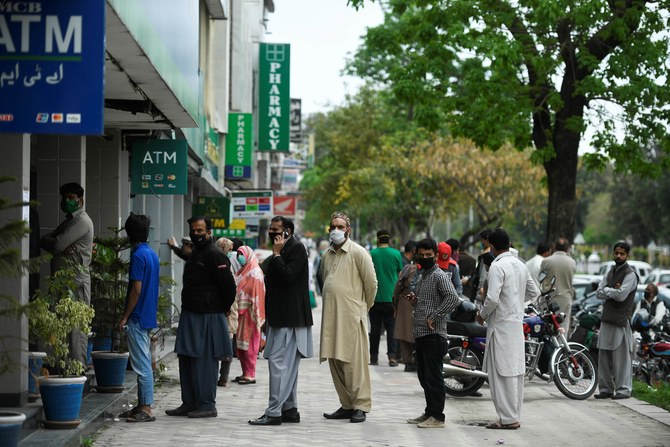ISLAMABAD: The Middle East, North Africa and Pakistan (MENAP) region is likely to witness significant growth in the e-commerce and digital payment industries in 2021, according to a report released by a global payment solution provider, Checkout.com, on Tuesday.
The report also claimed that nearly half of consumers will increase online shopping in the coming year.
Traditionally dominated by cash payments, the region has witnessed a behavioral shift during the coronavirus pandemic, making experts believe that people’s new shopping preferences are likely to persist even when the situation gets normal.
“While there has been a sudden surge in e-commerce and digital payments this year due to the impact of COVID-19, our report suggests what we are seeing today is more than a temporary change in consumer behavior. Our internal data shows an 86% increase in digital payment transactions on our platform since the start of the pandemic in the region,” said Sebastian Reis, EVP of Global E-commerce at Checkout.com, in a written statement.
“This presents a major opportunity for businesses across the MENAP region,” he continued. “However, to leverage this shift in consumer behavior and to succeed in what’s already a highly competitive space, businesses will need to offer not only the products and services consumers look for, but also the best online shopping experience, including payment processes that are safe, secure, and convenient for consumers.”
The report draws insights from a regional survey, which polled more than 5,000 consumers in September 2020 in the UAE, Saudi Arabia, Egypt, Jordan, Qatar, Kuwait, Bahrain, and Pakistan.
The pandemic is accelerating growth particularly in the online purchases of prepared meals (41%), clothing (37%), groceries (33%), and electronics (30%). While online orders of prepared meals and groceries appear to have surged evenly among males and females, men seem to be driving most of the e-commerce growth in electronics, and women account for a stronger increase in online clothing purchases.
The report further reveals that a majority (53%) of the region’s consumers most often pay for their online purchases using digital payments rather than cash on delivery (36%) or bank transfers (10%).
Digital payments are by far the most preferred payment method with online shoppers in the GCC, including Bahrain (74%), Qatar (66%), the UAE (64%), Kuwait (59%), and Saudi Arabia (54%). Meanwhile, cash on delivery is the preferred payment method in Pakistan (66%), Egypt (54%), and Jordan (51%).
“Robust digital payment options have become an integral part of what consumers expect from merchants, especially as e-commerce is more widely embraced in the MENAP region,” Reis added. “The more frequently consumers shop online, the more likely they are to pay by card or digital wallets rather than cash on delivery, making it clear that consumers are moving towards digital payments. Scaling digital payment platforms is thus a clear opportunity for merchants of all sizes to stay in step with consumer preferences and help build loyalty with their customers.”
The report says 47% of consumers across the eight countries say they expect to shop online more frequently over the next year. Only 15% expect their online shopping frequency to decline, while the remaining 38% expect it to remain about the same as now.
E-commerce, digital payments to increase in Middle East, Pakistan in 2021 — international survey
https://arab.news/6yc7e
E-commerce, digital payments to increase in Middle East, Pakistan in 2021 — international survey

- Checkout.com says digital payments have nearly doubled in the Middle East, North Africa and Pakistan region since the emergence of COVID-19
Pakistani court sentences TLP leader for 35 years over incitement against ex-chief justice

- The case stems from a 2024 speech targeting former Chief Justice of Pakistan Qazi Faez Isa over a blasphemy ruling
- Conviction follows the government’s move to proscribe Tehreek-e-Labbaik Pakistan after clashes with police this year
ISLAMABAD: A Pakistani court this week sentenced a leader of the religio-political party Tehreek-i-Labbaik Pakistan (TLP) to 35 years’ imprisonment on multiple charges for inciting hate against former Chief Justice of Pakistan Qazi Faez Isa.
Peer Zaheer ul Hasan Bukhari made the remarks in a 2024 speech at the Lahore Press Club against the former chief justice for issuing a judgment in a case involving a man named Mubarak Sani under the blasphemy laws, a member of a minority religious community whose death sentence was overturned.
Authorities said Bukhari’s comments amounted to incitement to violence, after which police registered a case against him under various terrorism-related provisions as well as charges of inciting hatred.
The cleric was handed multiple jail terms on a range of charges, with the longest being 10 years of rigorous imprisonment, amounting to a total of 35 years.
“All the sections of imprisonment awarded to the convict shall run concurrently,” Anti-Terrorism Court Judge Arshad Javed said in a letter to the Kot Lakhpat Central Jail superintendent.
A collective fine of Rs600,000 ($,150) was also imposed on the TLP party leader under the provisions of the Anti-Terrorism Act.
The move follows Pakistan’s decision in October to ban the TLP and designate it a proscribed organization under the Anti-Terrorism Act after violent clashes between its supporters and law enforcement in Punjab.
The unrest erupted as demonstrators attempted to travel from Lahore to Islamabad, saying they wanted to stage a pro-Palestine rally outside the US Embassy.
However, officials said TLP supporters were armed with bricks and batons, arguing their intention was to stir violence similar to earlier marches toward the federal capital.
The clashes between TLP supporters and police resulted in the deaths of five people, including two policemen, and injured more than 100 officers and dozens of protesters.
Led by Saad Hussain Rizvi, the TLP is known for its confrontational street politics and mass mobilizations.
Since its emergence in 2017, the party has repeatedly organized sit-ins and marches toward Islamabad, often triggering violent confrontations and prolonged disruptions on major routes to the capital.










